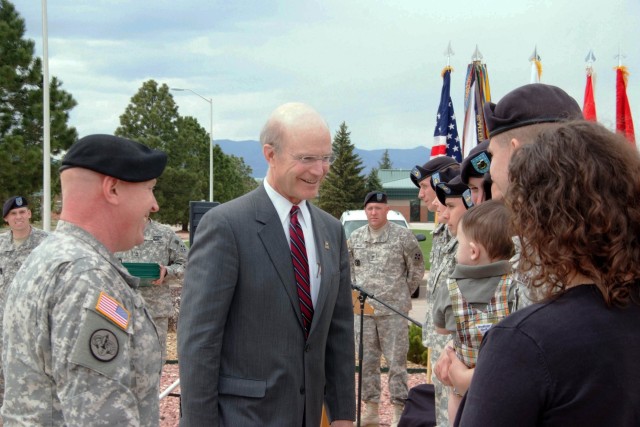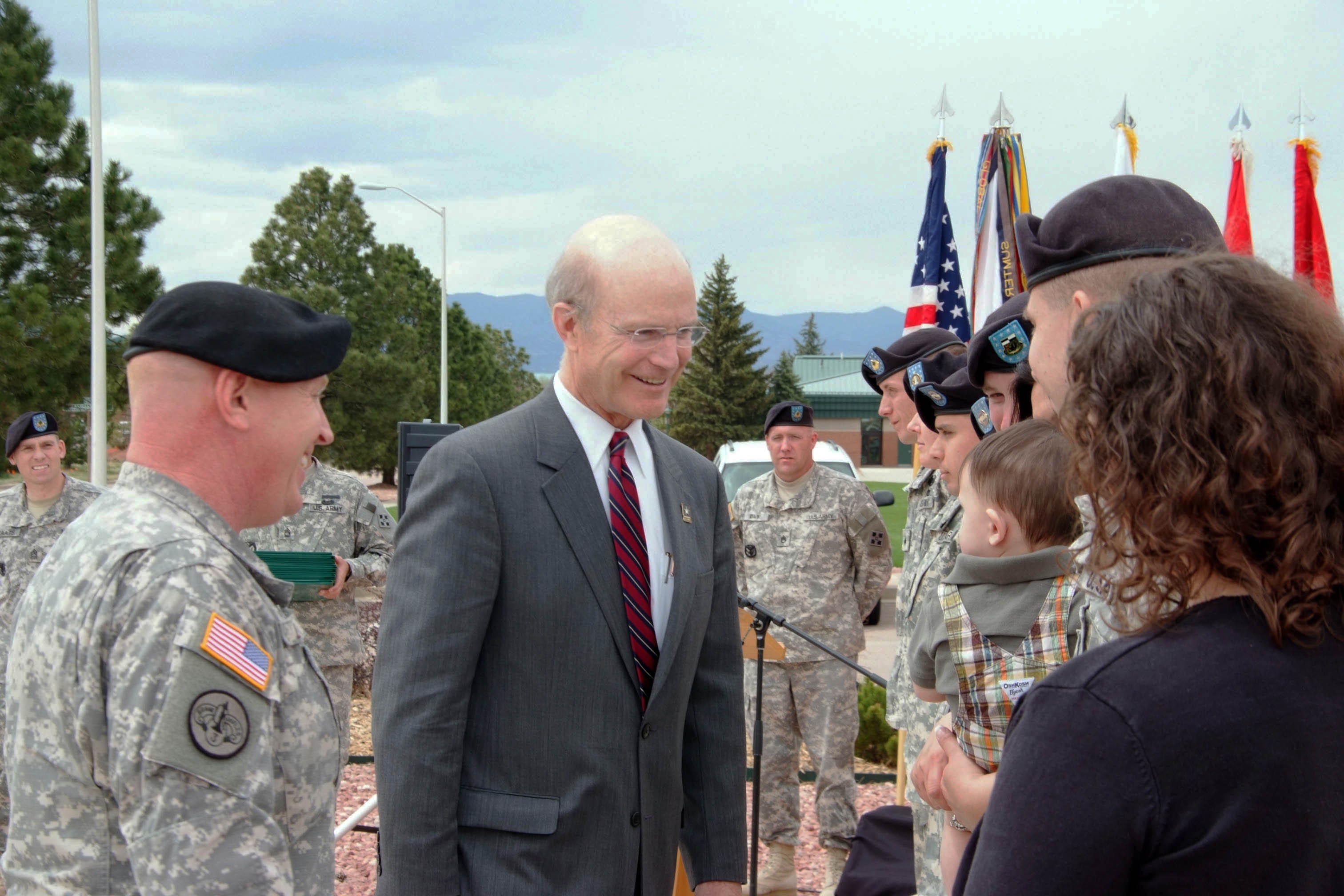FORT CARSON, Colo. (May 7, 2009) -- Secretary of the Army Pete Geren concluded his Tuesday visit to Fort Carson thanking Mountain Post Soldiers and families for their sacrifices as the U.S. continues fighting the longest war in the nation's history with an all-volunteer force.
"More than anything else, I wanted to come out to Fort Carson and meet with these Soldiers, meet with these families, and thank them for their extraordinary service during this most challenging period in our nation's history," Geren said Tuesday during a press conference with local media. The secretary said Fort Carson is home to "great Soldiers (and) great Army Families carrying a very heavy burden for our nation."
The secretary's visit included meetings with Fort Carson senior leadership, noncommissioned officers, Soldiers' spouses and Families of fallen heroes; lunch with Soldiers assigned to the Warrior Transition Unit and officiating a re-enlistment ceremony for five NCOs.
"We learned a great deal," he said. "It was a privilege for me to be a part of the life of Fort Carson for a day."
The secretary noted the Army designated 2009 as the Year of the Noncommissioned Officer in recognition of the "extraordinary contributions" NCOs are making to today's Army.
Geren, who noted 20 years have passed since the last "Year of the NCO," said it was time to once again recognize the vital role of the NCO. He said the NCO has "truly been the glue" that has held the Army together in the aftermath of the 9/11 attacks.
"The noncommissioned officer has held the Army Family together, held the Army together and has helped us accomplish the extraordinary things our Army has accomplished over the last seven years."
During the visit, Geren had the opportunity to administer the oath of enlistment to five Fort Carson NCOs who have decided to continue to answer the nation's call of duty.
"We have 300 million people in America and less than 1 percent of that population wears the uniform of the United States Military today," he said. "It is truly a privilege for me to be a part of this reenlistment ceremony where these outstanding Americans, these outstanding Soldiers, have decided to step up again and ... re-enlist in the Army and continue their service."
The secretary re-enlisted Sgt. Matthew Brugeman, 1st Battalion, 66th Armored Regiment, 1st Brigade Combat Team, 4th Infantry Division; Sgt. Jolene Wyrick, 43rd Brigade Special Troops Battalion, 43rd Sustainment Brigade; Sgt. Jose Torres, 60th Ordnance Company, 43rd SB; Sgt. Joshua Bevins, Headquarters and Headquarters Compnay, 4th STB, 4th BCT, 4th ID; and Staff Sgt. Bruce Goodwin, HHC, 1st BCT, 4th ID.
Geren also met with Warrior Transition Unit Soldiers to discuss how the Army can better improve the care it provides to its wounded, ill and injured warriors. The Army initiated the WTU approach two years ago and today has 36 WTUs around the country, with Fort Carson having one of the larger ones, he said.
"We treat them (the Soldiers) all the same," Geren said. "They are Soldiers, all part of the Army Family, and our commitment is to help them get well (to) either move on to their career in the Army or, for those who are choosing to get out, help prepare them for transition to ... civilian life."
He said, "The Warrior Transition Unit has been a major step forward for us. We realized there was an area of our medical care that we were not properly organized for, not properly resourced for, an area where the need had grown exponentially after the beginning of the war."
He said the WTU is a good model responsible for the "full healing and rehabilitation" of Soldiers, but the service is constantly refining the program. "It's different than it was a year ago, and certainly different than it was two years ago."
The secretary said Maj. Gen. Mark A. Graham, commanding general, Division West (First Army) and Fort Carson, was a pioneer for adding additional resources in the mental health and suicide prevention areas, which include mobile teams that take mental health care and support to the Soldiers.
"These are models I think we will end up carrying around to the rest of the Army" to improve the care provided to Soldiers.
When asked about the PiAfA+-on Canyon Maneuver Site expansion project, Geren said he is optimistic the Army will eventually be able to come to terms with the current landowners.
"Our goal is to come up with a way ahead that works for the Army and works for the landowners," he said. "We will continue to work in a cooperative fashion (with the state of Colorado and the landowners) and are hopeful we can arrive on a way ahead that meets the Army's needs and is also acceptable and can be embraced by the landowners."
He said it is Army leadership's job to make the case to Congress that the expansion is good for Colorado, the Army, and most importantly, good for national defense.
"It's a tough issue ... we know that," Geren explained. "If we are patient ...if we do a good job listening to the landowners, I'm confident that ultimately we will come to a mutually agreeable way ahead."
Geren said he would be both disappointed and surprised if the Army had to foreclose on the opportunity to expand PiAfA+-on Canyon.
"Colorado and the United States Army have a great partnership (that has) served Colorado well, served the United States Army well (and) served the United States defense well," he said.
The secretary noted the Army has big plans for Colorado, to include increasing the population at the Mountain Post from 19,000 Soldiers today to nearly 30,000 when the Base Realignment and Closure Committee moves are complete.
"We are making a very large ($2.5 billion) investment over a 10-year period in this region," he said. "We are excited about this partnership ... we're excited about growing in Colorado. We are about what Fort Carson has been and what Fort Carson is going to grow to be."


Social Sharing